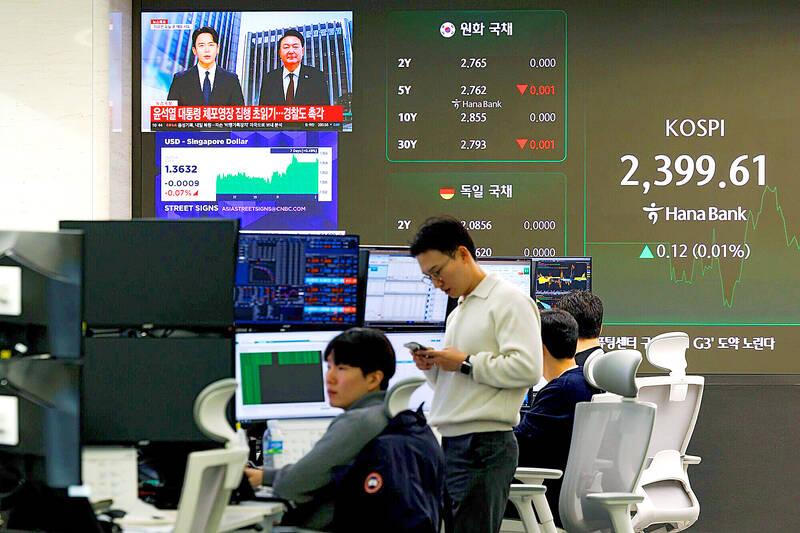South Korea cut its economic growth forecast for this year, reflecting the fallout from impeached President Yoon Suk-yeol’s martial law debacle and risks on the trade-reliant nation from US president-elect Donald Trump’s tariff plans.
The South Korean Ministry of Economy and Finance now sees the economy growing 1.8 percent this year after expanding 2.1 percent last year, it said in a statement yesterday. Those projections are down from July’s forecasts of 2.2 percent and 2.6 percent respectively, and underscore the pressure from weaker private consumption and easing export momentum.
Global uncertainties are a key risk for South Korea, as demand for memory chips might face a correction, and competition among export-reliant economies is intensifying, the ministry said. It also pointed to ongoing concerns about capital outflows to the US and the country’s political situation.

Photo: Bloomberg
The government’s outlook for this year is 0.1 percentage points lower than the view offered by the Bank of Korea (BOK) in November.
The BOK and government have pledged to offer unlimited liquidity if needed to limit the economic fallout from the political crisis. Speculation is growing among some economists that the BOK might lower its benchmark rate this month, in what would be a third consecutive cut since a policy pivot in October last year.
The BOK vowed yesterday to take a flexible approach to future rate cuts while closely monitoring risks amid increased political and economic uncertainty. It also said it is hard to stabilize the economy with monetary policy alone.
There is a growing chance that GDP might contract at the start of this year, and the economy might end up expanding less than 1.7 percent this year, iM Securities Co analyst Park Sang-hyun said in a note.
“If exports slow down, especially semiconductors, amid a deteriorating economy that is not expected to improve anytime soon, downside risks to domestic GDP growth in the first quarter of 2025 are likely to increase,” he said.

TAKING STOCK: A Taiwanese cookware firm in Vietnam urged customers to assess inventory or place orders early so shipments can reach the US while tariffs are paused Taiwanese businesses in Vietnam are exploring alternatives after the White House imposed a 46 percent import duty on Vietnamese goods, following US President Donald Trump’s announcement of “reciprocal” tariffs on the US’ trading partners. Lo Shih-liang (羅世良), chairman of Brico Industry Co (裕茂工業), a Taiwanese company that manufactures cast iron cookware and stove components in Vietnam, said that more than 40 percent of his business was tied to the US market, describing the constant US policy shifts as an emotional roller coaster. “I work during the day and stay up all night watching the news. I’ve been following US news until 3am

UNCERTAINTY: Innolux activated a stringent supply chain management mechanism, as it did during the COVID-19 pandemic, to ensure optimal inventory levels for customers Flat-panel display makers AUO Corp (友達) and Innolux Corp (群創) yesterday said that about 12 to 20 percent of their display business is at risk of potential US tariffs and that they would relocate production or shipment destinations to mitigate the levies’ effects. US tariffs would have a direct impact of US$200 million on AUO’s revenue, company chairman Paul Peng (彭雙浪) told reporters on the sidelines of the Touch Taiwan trade show in Taipei yesterday. That would make up about 12 percent of the company’s overall revenue. To cope with the tariff uncertainty, AUO plans to allocate its production to manufacturing facilities in

COLLABORATION: Given Taiwan’s key position in global supply chains, the US firm is discussing strategies with local partners and clients to deal with global uncertainties Advanced Micro Devices Inc (AMD) yesterday said it is meeting with local ecosystem partners, including Taiwan Semiconductor Manufacturing Co (TSMC, 台積電), to discuss strategies, including long-term manufacturing, to navigate uncertainties such as US tariffs, as Taiwan occupies an important position in global supply chains. AMD chief executive officer Lisa Su (蘇姿丰) told reporters that Taiwan is an important part of the chip designer’s ecosystem and she is discussing with partners and customers in Taiwan to forge strong collaborations on different areas during this critical period. AMD has just become the first artificial-intelligence (AI) server chip customer of TSMC to utilize its advanced

Six years ago, LVMH’s billionaire CEO Bernard Arnault and US President Donald Trump cut the blue ribbon on a factory in rural Texas that would make designer handbags for Louis Vuitton, one of the world’s best-known luxury brands. However, since the high-profile opening, the factory has faced a host of problems limiting production, 11 former Louis Vuitton employees said. The site has consistently ranked among the worst-performing for Louis Vuitton globally, “significantly” underperforming other facilities, said three former Louis Vuitton workers and a senior industry source, who cited internal rankings shared with staff. The plant’s problems — which have not